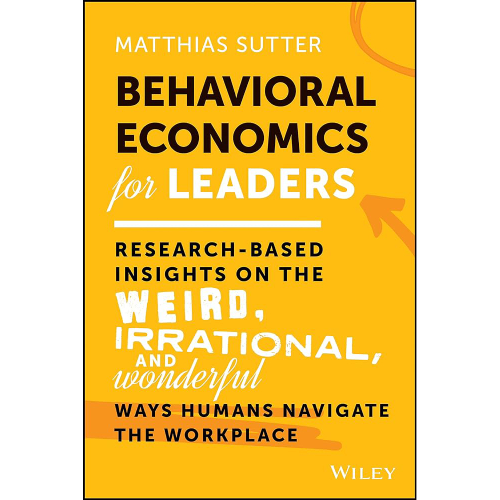Behavioral Economics for Leaders: Research-Based Insights on the Weird, Irrational and Wonderful Ways Humans Navigate the Workplace
Author: Matthias Sutter
Publisher: Wiley (December 2022)
ISBN – 10: 1119982979
Pages: 256
The field of behavioural economics has shed new light on a wide variety of behavioural phenomena. An understanding of its often-counterintuitive wisdom is essential for leaders who wish to set themselves apart from the pack and maximise their positive impact on their colleagues and their companies.
In Behavioral Economics for Leaders: Research-Based Insights on the Weird, Irrational, and Wonderful Ways Humans Navigate the Workplace, renowned behavioural economist Matthias Sutter delivers and surprising and practical exploration of how people in the real world respond to incentives, work together, and behave in groups. This books applies new and classic research to the everyday business world so frontline organisational leaders can improve their organisations in an evidence-based way.

The author explains how to become a better leader by interpreting and understanding the actions of your team members, as well as how to identify hidden biases in yourself and others so you can combat inequalities and inefficiencies. He offers a view of what makes people tick at work, allowing leaders to understand and, in some cases, predict the actions and reactions of their team members.
The books looks at home working as opposed to working in an office and explains the known advantages and disadvantages of both. It highlights that current research indicates that home workers are less likely to be promoted than those workers who remain working in the office. But productivity is higher with home workers.
The book is filled with surprising insights and based on solid economic research; the book summarises the implications of behavioural economics for real-world leadership. You’ll learn what makes people tick in the office, how they react to incentives, and what that means for the ways in which we work – or fail to work – together.
The book consists of 50 concise and informative chapters that cover topics in an informative way with good examples and informative guidance and insights. A number of chapters cover topics relating to productivity and incentives.
The author has produced an informative book with appropriate anecdotes throughout its pages, making the contents much more relatable. The short sharp chapters are self-contained, focusing as they do on single ideas and topics.
